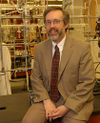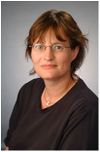Organometallics and main group chemistry
Advances in organometallic and main group chemistry are finding new application in a significant number of technologically important areas including medicine, energy systems, and synthesis. This symposium will highlight new directions in the synthesis, characterization and application of ORMT/MG species. The symposium will also present new work involving the synthesis and characterization of new cluster compounds.
This session will take place on the afternoon of Thursday, June 3rd in Dunn 206.
Session organizer
James T. Spencer is professor of chemistry at Syracuse University. His research focuses on polyhedral clusters, and solid state boron-based materials for thin films, nanoparticles, and nanotubes.
Confirmed speakers
Karin Ruhlandt-Senge studied at Johann Gutenberg Universität in Mainz, Germany, the Philips Universität in Marburg, Germany and the University of California, Davis, USA. In 1991, she was awarded a Dr. rer. nat. for her work on inorganic chemistry and crystallography from the Philips Universität. She conducted postdoctoral work on group IIIA metal chemistry and crystallography at the University of California, Davis under the supervision of P. P. Power (1992-1993). In 1993 she accepted a faculty position at Syracuse University (USA), recently (2009) becoming department chair and distinguished professor. Ruhlandt-Senge was the recipient of an NSF Career award (1997 to 2002) and a NSF Special Creativity Award (2007). She held visiting professorships at the University of Auckland, New Zealand and Monash University, Australia. Current research interests extend to synthesis of s and f-block organometallics, materials chemistry, crystallography of reactive complexes, and development of green synthetic methods.
Program
Thursday, June 3, 1:00 PM - 3:55 PM
- Organometallics and Main Group Chemistry
- Dunn 206
Organizer/Presider: James Spencer
1:00 210 Ion Association, Non-Covalent Interactions, Ligand and Co-Ligand Characteristics – What Is Affecting the Structure and Function of Heavy Alkaline Earth Organometallics?. Karin Ruhlandt-Senge1, Marites Guino-o1, Jacob S. Alexander1 and Ulrich B. Englich2, (1)Syracuse University, (2)Cornell University
1:40 211 Synthesis and Reactivity of Phosphaalkenes Utilizing Triamidoamine-Supported Zirconium Complexes. Andrew Roering and Rory Waterman, The University of Vermont
2:00 212 Insertion Reactions Involving a Triamidoamine-Supported Zirconium Complex. Sarah Leshinski and Rory Waterman, The University of Vermont
2:20 Intermission
2:35 213 Investigation of the RTLE Route: Effect of pKa and Steric Bulk on the Rate of the Reaction. Abhilasha Verma1, Daniel Weismann2, Andrew R. Powers1, Miriam M. Gillett-Kunnath1, Helmut Sitzmann2 and Karin Ruhlandt-Senge1, (1)Syracuse University, (2)TU Kaiserslauern
2:55 214 Alkaline Earth Metal Complexes of Azobenzene Derivatives. Johann Pichler1, Daniel Weismann2, Abhilasha Verma3 and Karin Ruhlandt-Senge3, (1)Graz University of Technology, (2)University of Kaiserslautern, (3)Syracuse University
3:15 215 Novel Amidinate and Guanidinate Ligands and Their s-Block Metal Complexes. William Maudez, Stephanie Wiebke Eilers and Karin Ruhlandt-Senge, Syracuse University
3:35 216 Structural Studies of Novel Alkaline Earth Metal Primary/Secondary Amides. Ana Torvisco and Karin Ruhlandt-Senge, Syracuse University


